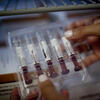Pharmacokinetics (PK) refers to the changes in drug and/or drug metabolite concentrations in the body over time and can be described by four processes: absorption, distribution, metabolism, and excretion (ADME). In this certificate program, you will learn how modeling and simulation are critical tools for prediction of drug pharmacokinetics, safety, and efficacy in the human body.
The Pharmacokinetics and Mechanistic Modeling Certificate experience
Students in the Pharmacokinetics program can take advantage of this 12-credit, stackable graduate certificate, offered with asynchronous and synchronous online courses. Successfully completed credits from the program can be transferred to the master's in Pharmacokinetics.
Students complete the following required courses:
- Pharmacokinetic Principles in Drug Discovery and Development: Small and Large Molecules (3 credits)
- In Vitro-In Vivo Extrapolation in Pharmacokinetics (3 credits)
- Mechanism Based Pharmacokinetic - Pharmacodynamic Modeling (3 credits)
- Pharmacokinetic Principles to Meet Regulatory Guidance Requirements (3 credits)
Get more from your education
Our dedicated team of student support specialists, long list of student-run organizations, and renowned faculty make the Temple School of Pharmacy about more than just academics.
Frequently Asked Questions
Check out our FAQs below. If you do not see an answer to your question, contact us directly at [click-for-email].
The Pharmacokinetics and Mechanistic Modeling program is designed for students interested in careers in pharmaceutical research in academia, industry, government, and other research and development environments. Ideal candidates for the pharmacokinetics program include:
- Expected or recent college graduates in biology, chemistry, pharmaceutical sciences, or other life sciences
- Current graduate students
- International students (must be English language proficient)
- Professional students (e.g. PharmD students)
- Pharmaceutical professionals looking to advance their careers
Our pharmacokinetics program will prepare you for the many job opportunities related to pharmacokinetics and PK-PD modeling with employers such as:
- Pharmaceutical biotech, cosmetic and nutritional companies
- Clinical pharmacy
- Consulting
- Contract research organizations (CROs)
- Intellectual property/law firms
- Not-for-profit research institutions
- Regulatory agencies
- Research foundations
- Academia
It is also a great place to start if you plan to enroll in the Pharmacokinetics master's program.
Tuition for the Pharmacokinetics and Mechanistic Modeling certificate program is competitive with lots of opportunities for financial support. Tuition rates are set annual by the university and depend on different factors. View more detailed information.
Yes. Credits earned in the Pharmacokinetics and Mechanistic Modeling graduate certificate program can be applied to many master's and professional degree programs, including:
- Pharmacokinetics MS
- Drug Delivery MS
- Drug Discovery MS
- PharmD
Please contact [click-for-email] for more details.
The 12-credit graduate certificate in Pharmacokinetics and Mechanistic Modeling is offered fully online with asynchronous and synchronous components. Students can start in the fall and the spring.
Application Information
Applying is straight-forward and convenient, with Temple's Online Graduate Application Portal.
- Set up an account on our Graduate Application Portal. Once you complete the form, you will receive an email to complete your set up.
- Complete all of the required personal information in the Application Portal.
- Submit all required documents, as listed below.
Once all documents have been received, your application will be submitted to our review panel for evaluation. A faculty member will be in touch within a week of submitting your application with a timeline for an admissions decision.
- A baccalaureate degree in Pharmaceutical Sciences, Chemistry, Biology, Math, Chemical Engineering, Biochemistry, or a related discipline is required, with an undergraduate GPA of 3.0 or higher.
- Letters of Reference: Two (2) letters of recommendation should be obtained from college/university faculty members familiar with the applicant's academic competence and or from professionals in a supervisory position.
- Transcripts: Transcripts from all post-secondary institutions attended may be sent electronically to [click-for-email]. Alternately, unopened official transcripts bearing the school's seal must be sent directly from the Registrar at each institution to the School of Pharmacy's Office of Graduate Studies.
- Applicants who earned a degree at a non-U.S. institution must submit an equivalency evaluation of their transcript(s) through a third-party provider, either World Education Services (WES) or Educational Credential Evaluators (ECE).
- Resume: Current resume or CV is required whether applying for the Thesis Option or the Non-Thesis Option.
- Statement of Goals: In approximately 500 to 1,000 words, applicants should state their specific interest in Temple's program, research goals, future career goals, and academic and research achievements.
- Standardized Test Scores: Applicants who earned their baccalaureate degree from an institution where the language of instruction was other than English, with the exception of those who subsequently earned a master's degree at a U.S. institution, must report scores for a standardized test of English that meet these minimums:
- TOEFL iBT: 85
- IELTS Academic: 6.5
- PTE Academic: 58
Questions?
Reach out to learn more about this program, discuss admissions criteria, or schedule a time to meet with a faculty member.
Graduate Studies Admissions in the Department of Pharmaceutical Sciences
Office of Graduate Studies, Suite 528
3307 North Broad Street
Philadelphia, PA 19140
215-707-4972
tuspgrad@temple.edu


